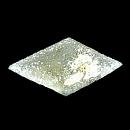|
ClassicGems.net |
|
|
 |
|
Pirssonite |
|
|
Discovered in 1896; IMA status: Valid (pre-IMA; Grandfathered). |
|||
|
|
|
Chemistry |
|
|
|
|
|
Na2Ca(CO3)2·2(H2O) |
|
|
|
Hydrated Sodium Calcium Carbonate |
|
Molecular Weight: |
242.11 gm |
|
Composition: |
Sodium |
18.99 % |
Na |
25.60 % |
Na2O |
| Calcium |
16.55 % |
Ca |
23.16 % |
CaO |
|
| Hydrogen |
1.67 % |
H |
14.88 % |
H2O |
|
|
|
Carbon |
9.92 % |
C |
36.36 % |
CO2 |
|
|
Oxygen |
52.87 % |
O |
|
|
|
|
|
100.00 % |
|
100.00 % |
= TOTAL OXIDE |
|
|
|
||||
|
Classification |
|
|
|
|
|
Carbonates |
|
|
5/D.02-50 |
|
|
|
5 : CARBONATES (NITRATES) |
|
Related to: |
Thermonatrite - Chalconatronite Series |
|
|
|
|
Crystal Data |
|
|
|
|
|
Hemimorphic crystals, to 2 cm; granular, massive, may be as efflorescences. |
|
|
None |
|
|
|
|
|
Physical Properties |
|
|
|
|
|
None |
|
|
Conchoidal |
|
|
Brittle |
|
|
3.0 - 3.5 |
|
|
2.352 - 2.382 (g/cm3) |
|
|
Fluorescent and Phosphorescent; SW UV = weak blue-white to blue-gray |
|
|
Not Radioactive |
|
|
Other: |
Pyroelectric; with the end of the [001] axis terminated by {131} becoming negatively electrified on cooling. Soluble in H2O, leaving CaCO3. |
|
Optical Properties |
|
|
|
|
|
Colorless, Grayish, White |
|
|
Transparent to Translucent |
|
|
Vitreous |
|
|
1.5043 - 1.5751 Biaxial ( + ) |
|
|
0.0708 |
|
|
Relatively Weak; r < v |
|
|
None |
|
|
|
|
|
Occurances |
|
|
|
|
|
Geological Setting: |
A rare component of saline lake-bed sediments; in a differentiated alkalic massif. |
|
Common Associations: |
Gaylussite, Northupite, Trona, (Borax Lake, California, USA); Bradleyite, Gaylussite, Northupite, Shortite, Trona (John Hay, Jr. Well No. 1, Wyoming, USA). |
|
Common Impurities: |
n/a |
|
Type Locality: |
Searles Lake, San Bernardino County, California, USA |
|
Year Discovered: |
1896 |
|
View mineral photos: |
|
|
|
|
|
More Information |
|
|
|
|
|
|
|
|
|
|
|
Pirssonite was named to honor Professor Louis Valentine Pirsson (1860–1919), American petrographer and mineralogist, Professor of Physical Geology at Yale University, New Haven, Connecticut, USA. Pirssonite is one of several carbonate minerals that form in non-marine evaporite deposits. Other evaporite carbonates include Trona, Gaylussite, Northupite, Nahcolite and Thermonatrite. Evaporite minerals are geologically important because they clearly are related to the environmental conditions that existed at the time of their deposition, namely arid. They also can be easily recrystallized in laboratories in order to confirm their specific characteristics of formation. Chemically, Pirssonite and Gaylussite differ only in their number of water molecules, yet their symmetries are quite different. This is an indication of a change in their respective crystal structures. The two are best distinguished by their crystal habits in which Pirssonite has a distinctive tabular diamond-shaped crystal form. Pirssonite can lose its water molecules and specimens should be stored in a sealed container. Distribution: in the USA, the type locality at Searles Lake, San Bernardino County, California; also in California at Borax Lake, Lake County, in Deep Spring Lake, Inyo County, and at Owens Lake, Mono County; in the John Hay, Jr. Well No. 1, about 30 km west of Green River, Sweetwater County, Wyoming. On the Arizaro, Pastos Grandes, and Pozuelos playas, Salta Province, Argentina. From the Jequetepeque River Valley, northwest Peru. On the Otjiwalundo Salt Pan, about 400 km west-northwest of Otavi, Namibia. In the Beypazari Basin, Ankara, Turkey. On Mt. Kukisvumchorr, Khibiny massif, and Mt. Alluaiv, Lovozero massif, Kola Peninsula, Russia. |
|
|
Pirssonite gems for sale: We have not photographed our Pirssonite gems. Please check back soon. |